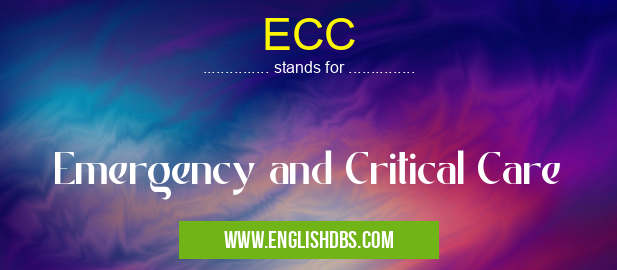What does ECC mean in UNCLASSIFIED
We all use a variety of abbreviations and acronyms in our everyday life. From text messages to emails, the language of communication has evolved so much that some shortened words are now part of our daily vocabulary. One such acronym is ECC which stands for Emergency and Critical Care. ECC is a term used to describe the medical provision provided during emergency or critical situations such as sudden cardiac arrest or traumatic accidents.

ECC meaning in Unclassified in Miscellaneous
ECC mostly used in an acronym Unclassified in Category Miscellaneous that means Emergency and Critical Care
Shorthand: ECC,
Full Form: Emergency and Critical Care
For more information of "Emergency and Critical Care", see the section below.
What is ECC?
ECC stands for Emergency and Critical Care and is the provision of medical treatment during times of urgency or crisis. In an emergency situation, ECC involves providing rapid diagnosis, stabilization and prompt transport to a more suitable healthcare environment if necessary. During critical care, ECC may involve providing specialized equipment and support services in order to stabilize a patient whose illness or injury has exceeded normal care resources. This may include monitoring vital signs, administering medications, performing diagnostic tests and providing life-saving interventions such as mechanical ventilation or cardiopulmonary resuscitation (CPR).
How Does it Benefit People?
ECC can help to save people’s lives in times of emergency or critical situations by providing rapid diagnosis and stabilization backed up with prompt transport if required. During critical care ECC can provide specialized equipment and support services needed to properly treat a patient whose illness or injury has exceeded normal care resources. It is also beneficial in assisting people after being involved in traumatic accidents through swift diagnosis, response times and access to specialist treatments if required within the immediate moments of an accident occurring.
Essential Questions and Answers on Emergency and Critical Care in "MISCELLANEOUS»UNFILED"
What is Emergency and Critical Care?
Emergency and Critical Care is a medical specialty that focuses on providing immediate treatment for life-threatening conditions, such as heart attack or stroke. It also provides care for critically ill patients who require extensive supportive care until they are stabilized.
How can I find an ECC facility near me?
You can search online for emergency and critical care facilities in your area. You may also be able to find a list of local hospitals that provide ECC services by contacting your local health department or visiting the website of the American College of Emergency Physicians (ACEP).
Is my condition life-threatening enough to warrant an ECC visit?
If you are experiencing any major symptoms, such as chest pain, difficulty breathing, or severe bleeding, it is best to contact emergency services right away. The professionals at an ECC facility will be able to assess your situation and determine the appropriate course of action.
What type of treatments are available through emergency and critical care?
The exact treatments available will depend on the patient's individual needs. Common treatments include intravenous fluids, medications, oxygen therapy, transfusions, surgery, wound repairs, resuscitation efforts, and mechanical ventilation.
Who should go to an ECC after a traumatic event?
Anyone who has suffered a traumatic injury should seek medical attention at an ECC facility as soon as possible in order to receive rapid evaluation and treatment from specially trained personnel.
When should I bring my loved one to an ECC?
Any time you suspect that your loved one may have suffered a life-threatening injury or illness requiring complex medical interventions - such as heart attack symptoms - you should bring them immediately to an ECC facility for assessment and treatment.
Can I make arrangements ahead of time if I know someone needs emergency care?
It's always best to call 911 if someone urgently requires medical attention due to a potentially life-threatening injury or illness. However, if you have knowledge about their specific condition prior to arriving at the hospital you may want to make arrangements ahead of time by calling the ECC ahead of your arrival so they can prepare resources for the best possible care when you arrive.
How long do patients typically stay in the ER/ECC?
The length of stay varies greatly depending on each patient’s individual condition; it could range from several hours up to days or even weeks depending on how severe their condition is and what type of treatments they require.
What type of tests do ER/ECC doctors perform?
In addition to physical exams, doctors in emergency and critical care departments will typically conduct various tests such as blood tests (such as CBCs), X-rays or MRIs, CT scans and ultrasounds in order to properly diagnose conditions before providing proper treatment.
When should I consider seeking follow-up care after leaving the ER/ECC?
Follow-up followup visits with another physician are usually recommended after leaving an ER/ECC if there have been any changes in health since discharge like ongoing pain or vomiting; unexplained weight loss; new persistent symptoms; fever; worsening symptoms or lab results; mental confusion or memory problems; breathing difficulties; cardiac issues; uncontrolled diabetes symptom not responding well with current medication regimen:[ END].
Final Words:
In conclusion, Emergency and Critical Care (ECC) plays an important role in helping people receive appropriate medical treatment during emergent or critical situations. Through prompt response times alongside specialist assistance for those requiring more extensive care than usual, ECC offers significant advantages over regular healthcare provisions enabling people to get the treatment they require quickly when they need it most.
ECC also stands for: |
|
| All stands for ECC |
